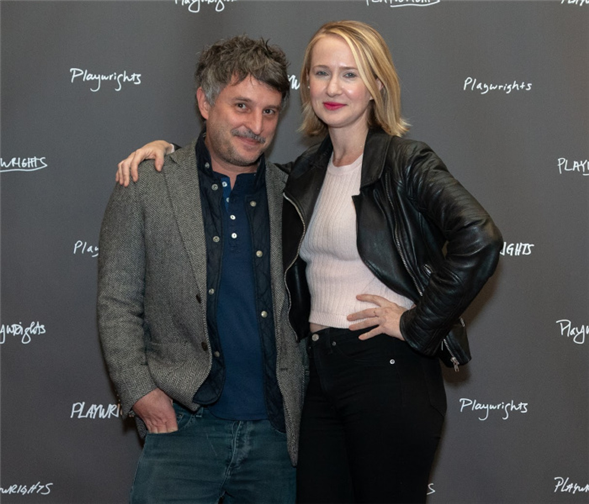He’s the Only Director Who Makes Her Comfortable Enough to Bare All
Home > TDF Stages > He’s the Only Director Who Makes Her Comfortable Enough to Bare All

Halley Feiffer and Trip Cullman discuss collaborating on The Pain of My Belligerence at Playwrights Horizons
—
“We joke that this is the healthiest relationship in our lives,” says Halley Feiffer, gesturing to Trip Cullman. The playwright and director are longtime artistic partners currently working on their sixth project, the world premiere of The Pain of My Belligerence at Playwrights Horizons, which Feiffer also stars in. A searing portrait of the destructiveness of the patriarchy, the play chronicles the devolution of an unhealthy relationship as Donald Trump ascends to the presidency. Up-and-coming journalist Cat (Feiffer) is completely undone by her romance with married restaurateur Guy (Hamish Linklater). Over the course of eight years, they find themselves caught in a cycle of codependency and abuse as she gets progressively sicker, both emotionally and physically.
Diving headfirst into uncomfortable relationships is Feiffer’s forte. Her previous dark comedies have explored dysfunctional siblings with a penchant for face-licking (How to Make Friends and Then Kill Them), abusive father-daughter dynamics (I’m Gonna Pray For You So Hard) and falling in love in a decidedly depressing setting (A Funny Thing Happened on the Way to the Gynecologic Oncology Unit at Memorial Sloan Kettering Cancer Center). The daughter of celebrated American cartoonist and writer Jules Feiffer, she started out as an actress before turning her focus to playwriting. The Pain of My Belligerence is loosely based on her own life, making her a natural for the role. Like Cat, she struggled with Lyme disease and a poisonous relationship simultaneously, which inspired her to examine her part in her pain.
“I was having disheartening experiences with male doctors while I was also having what I realized were similarly disheartening experiences with men,” she recalls. “While I’m not putting all the blame on myself, I was the common denominator in those experiences. I became interested in the ways in which I was powerful and could break free from toxic patterns that were holding me back.”
After Trump became president, it was clear to Feiffer that this play was about more than just one bad romance; it was an examination of how toxic masculinity damages both women and men. “When the election happened, I realized the play was already about it, and I wanted to work to make it even more clearly about how this phenomenon has poisoned all of us,” she says, adding that she then went back and retroactively made the show’s scenes take place on different presidential election nights, four years apart. “It felt very organic, like it was supposed to happen all along.”
Although The Pain of My Belligerence is bitingly funny, it’s also intense and raw — there’s lots of profanity, nudity and graphic sex scenes. Cullman says the show, like Feiffer’s work overall, doesn’t “fit the mold” of what most audiences expect from a play written by a woman. To him, that’s “super exciting. It’s very political and very feminist.”
Feiffer and Cullman have a palpable camaraderie but, more importantly, reciprocal esteem. That’s why their artistic partnership works so well. “When we’re collaborating in a room with other people, we don’t interrupt each other,” he says. “And they’re shocked by that. We’ll go into a marketing meeting or a production meeting or where other people are involved, and in my head I’m taking mental notes on how many times men interrupt her. Constantly.” Feiffer didn’t even notice it happening, she says, because she was so used to being cut off.
The artistic relationship they’ve forged supports a creative environment where her plays’ thorny themes can be examined in a safe space. That was especially important for The Pain of My Belligerence since Feiffer strips herself bare, both figuratively and literally. “I think the two of us are trying to create a Utopian ideal of interaction and collaboration,” Cullman says. “It’s so rare in life that you get to have a connection with another human being where the foundation is unbelievable mutual respect and trust and joy. I think because we have that, we are able to explore how really dark the situations are within the work itself.”
—
TDF MEMBERS: At press time, discount tickets were available for The Pain of My Belligerence. Go here to browse our current offers.
Carey Purcell writes about pop culture and politics for Vanity Fair, The Village Voice, Politico, and other publications, and blogs at CareyPurcell.com.
Top image: Trip Cullman and Halley Feiffer. Photo by Gerda Mostonaite.

